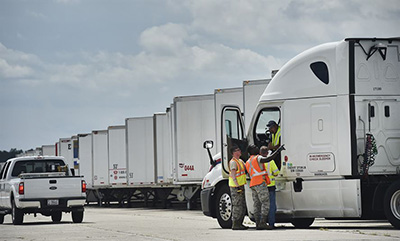During most of the invasion of Iraq I was safely ensconced in a headquarters outside of Venice, overseeing transportation of many millions of tons of supplies and thousands of people originally destined for the northern front. We tracked sometimes more than 300 flights per day, not to mention ships, trucks, trains, tankers, and thousands of specialists from dozens of transportation-related specialties.
Several amazing people worked for me to make all that happen.
One day someone important came into our area to ask for updates on one of the general's new priorities. I had told my sharpest leader to take care of that the day before. A look at his face and no words were needed: he had forgotten to do it.
This was a major screw up. The facts were clear: I had issued the order, and the task was not done. The words almost popped out of my mouth without thinking: “He forgot!”
Fortunately, before those terrible words vomited out of my mouth, I recalled what I had told him earlier that day: “You have never failed me. I cannot believe all that you have been able to keep up with. Thank you.” I realized that he had worked and sacrificed and succeeded over and over. He had made me look like a hero in meetings and teleconferences dozens of times in front of three-star and four-star generals and other important leaders.
He had not failed me. He had succeeded a thousand times, and he was briefly overcome by forces that vastly outnumbered him.
I took all the blame. That was my role: to protect my people from being overwhelmed. And since I had failed at that, then my duty was to be the first person taken out by the wave before it got to those who trusted in my leadership. With any luck whoever replaced me would serve them better, but they would serve with no less honor.
A lot of supply chain leaders feel the same today as I did then: nearly overwhelmed by all the demands. Some might even blame their overwhelmed workers, but I bet most make the same decision I did to protect their workers as much as possible. COVID-19 is testing our supply chains. But there's a clear sign that supply chain leaders and workers are succeeding wildly against the odds.
For much of human history, pandemics were accompanied by famine, and famine feeds pandemics in a vicious cycle. Yet we don't see widespread shortages of necessities, at least not the kind that are widespread killers of people.
You probably studied the bullwhip effect. There's a powerful shock that's going to shock the system, a combination of retail stores shutting down leading to massive inventory spikes along the supply chain combined with factories shutting down. Additionally, traditional global supply chains are changed forever, and the globe had already accumulated dangerously high levels of debt by both consumers and governments.
To confront the coming shocks, you're going to need lots of workers to sacrifice even more in the coming months. Those working to produce and distribute protective equipment for healthcare workers as well as supermarket supply chain leaders are on the frontlines, but we're all going to have to adapt to a new reality.
Supply chain leaders: be appreciative of your people. Continue to protect them from the next wave, and the one after that. Listen to their needs. And remember while you sit in your office and in your meetings—a no-less necessary job—people are going out into the world to do the work of feeding and distributing people's needs.
If my experience is any indication, nobody works harder for you than someone who sees that you appreciate their sacrifices.
SC
MR


Latest Supply Chain News
Latest Podcast

 Explore
Explore
Business Management News
- AdventHealth named top healthcare supply chain by Gartner
- Unlocking retention: The role employee engagement plays
- Can supply chain managers embrace an entrepreneurial mindset?
- Challenges to ESG reporting
- With capacity to spare, logistics real estate demand remains subdued
- How to improve demand forecasts for new product families
- More Business Management
Latest Business Management Resources

Subscribe

Supply Chain Management Review delivers the best industry content.

Editors’ Picks





